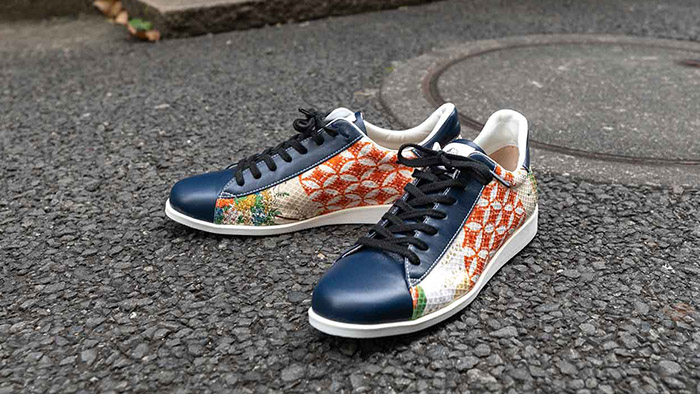
Inspired by Japanese culture, unique sneakers are making a statement and creating waves in the fashion industry. Some fashion companies have re-imagined the use of kimono and obi in Japan by repurposing them for service to create custom sneakers and footwear for men and women. Each shoe upper is made from kimono or obi – the belt-like sash used to tie a kimono.
In a world of mass-produced consumer goods, this uniqueness stands out from other footwear options and supports the initiative of Cool Japan. Repurposed kimonos create beautiful and unique sneakers that men or women can wear on any occasion, even formal events. The materials used are eco-friendly, beautiful, and perfect for breathing new life into something valued and treasured.
Mottainai’s philosophy, often associated with Japan’s traditional culture, says that one should not waste anything. According to the principle of mottainai, even items such as a kimono can have a different life than something else, such as Japanese sneakers.
Typically, traditional kimonos are often worn on special occasions and passed down from one generation to the next. This practice alone follows Mottainai’s philosophy by placing value on these family keepsakes.
Recycling kimonos and obi – the sash tied around a kimono – can transform them into sneakers with the same elegant design and patterns.
Kimonos get tied with a himo tare. Once tied, it’s an obi belt. These belts are symbolic of family tradition as every family uses its exceptional designs and patterns.
Since every pair gets created with a unique pattern and design, there are never two exactly alike pairs. It’s a dream come true for shoe collectors and lovers alike.
Customers can create the perfect pair for their wardrobe needs with multiple customization options, including laces, velcro, black soles, white soles, and wooden patterns. These comfortable and fashionable shoes feature intricate kimono patterns that incorporate inspiration from nature including flowers, trees, and birds. Colours frequently implemented in kimonos include red, blue, green, and yellow.
During the Edo Period (1603–1868), this sustainability practice came about when kimonos became a source of secondhand clothing materials due to rising living costs and high taxation. Fast forward to the present day, and we see the practice of repurposing kimonos as an innovative and groundbreaking approach to cut textile waste.
Some people find it difficult to imagine that an expensive piece of clothing, like a kimono, can become something else. Still, there is a robust mottainai culture in Japan that views each item with value and purpose.
As more people from around the globe seek out new fashion statement pieces and ethical companies and products to support, these shoes are an exciting option for fashionistas who value style and comfort.
With nearly endless possibilities of combinations, there is no better way to refresh your footwear collection. Moreover, because of its roots in Japanese tradition, the tenants of sustainability are sewn right into every customized pair.
This rare approach has drawn positive interest among Westerners curious about Japanese culture. Increasing awareness of this new fashion trend places it in a unique position to support Cool Japan in delivering delightfully crafted products inspired by Japanese culture to the rest of the world.